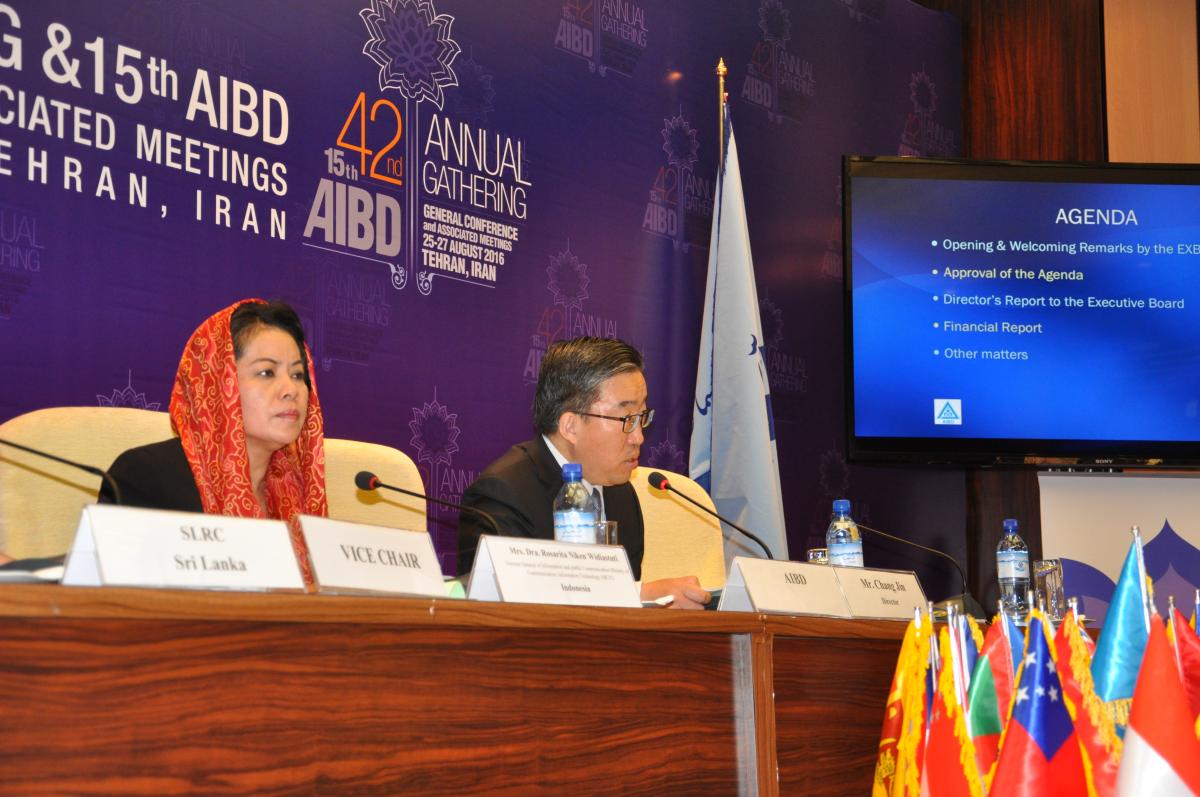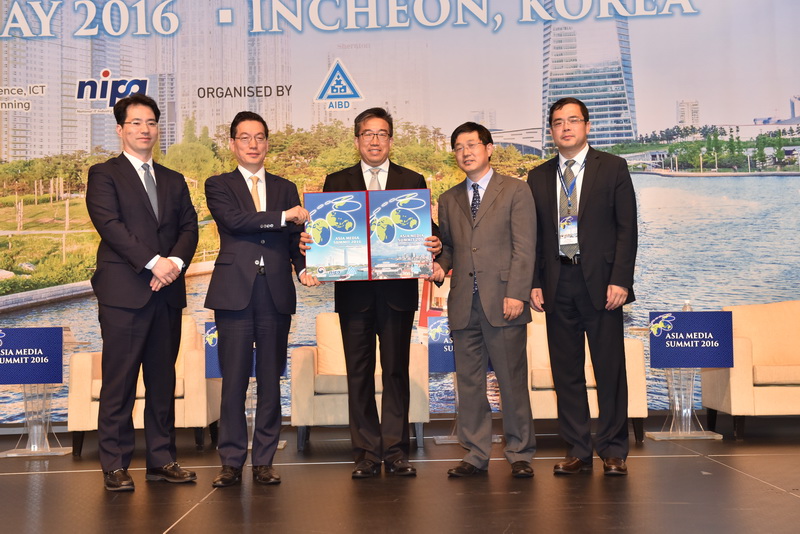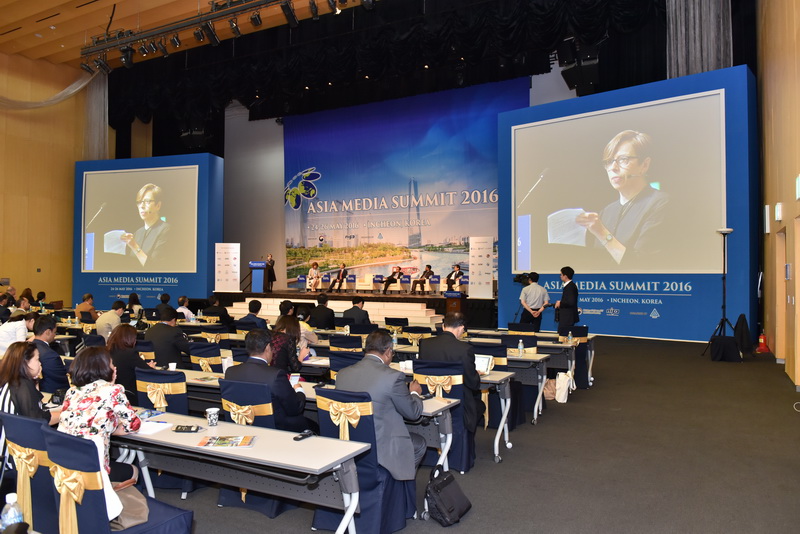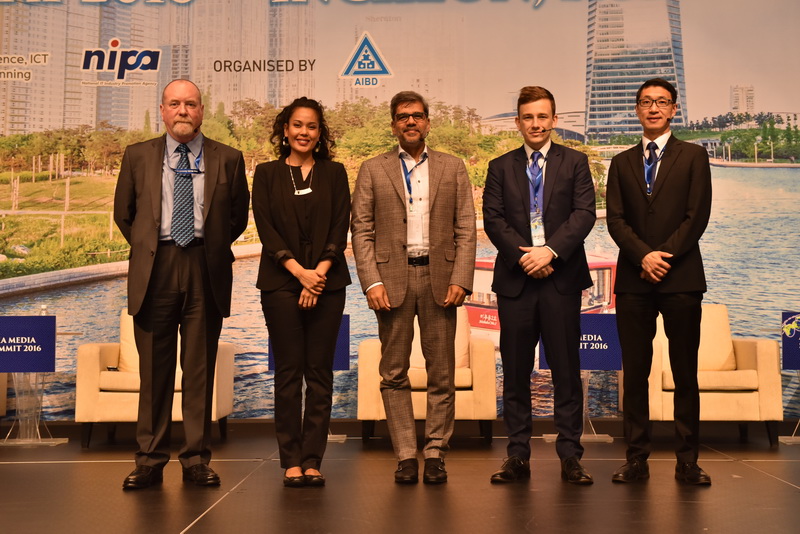Broadcasters in Asia-Pacific need to adapt to changes driven by accelerating technologies and pervasive influence of modern media and social networks. They must, however, be wary of the authenticity of some information and news that broadband media generates.
Dr Ali Askari, President of the Islamic Republic of Iran Broadcasting (IRIB), delivered this message during the inauguration ceremony of the 42nd Annual Gathering/15th AIBD General Conference held in Tehran, Iran on 25 August 2016.
Broadcasters in Asia-Pacific need to adapt to changes driven by accelerating technologies and pervasive influence of modern media and social networks. They must, however, be wary of the authenticity of some information and news that broadband media generates.
Dr Ali Askari, President of the Islamic Republic of Iran Broadcasting (IRIB), delivered this message during the inauguration ceremony of the 42nd Annual Gathering/15th AIBD General Conference held in Tehran, Iran on 25 August 2016.
In his keynote speech, Dr Askari said modern media and social networks have become important platforms for the fast dissemination of global information, rivaling the capability of broadcasting channels.
“This rapid dissemination, however, puts into question the authenticity of their news and sources. Audiences continue to rely on broadcast channels for news because of their reliability and credibility,” he said.
Dr Askari offered to share the experience and expertise of IRIB to AIBD member countries in human resource capacity building and broad-based training in order to deal with the increasing importance of broadband media and growing demands of audiences.
In his welcome remarks, Dr Abbas Naseri Taheri, Advisor to IRIB President and Director General for International Affairs, IRIB, stressed the value of cooperation between IRIB and AIBD for the past 24 years.
He said IRIB, particularly the IRIB University, is ready to support AIBD in implementing its training programmes bearing in mind the University’s experienced faculty members and advanced training facilities.
Dr Sadollah Nasiri Gheydri, Secretary General, Iranian National Commission for UNESCO, also spoke before some 70 local and foreign delegates.
In his speech, he highlighted the key roles of media in awareness-raising of issues, promoting democracy and sustainable development. What’s important, he said, is to ensure a free and independent media environment to carry out these media responsibilities.
“We need to adopt good laws on the freedom of expression and the right to information…. These laws must be implemented,” he said.
Dr Nasiri also stressed the need to promote pluralistic media for transparency and prevent dominance of wealthy families or people in power over media. He also urged broadcasters to help promote media education, in particular media literacy for the youth.
In her welcome remarks, Dra Rosarita Niken Widiastuti, President of AIBD General Conference, says AIBD’s future can be assured if it adapts to the changing media landscape, one that is flexible and responsive to the training needs of its members.
She said the Institute must also have a steady stream of revenue source to be able to engage in relevant initiatives and support quality training programmes, and be one that continues to expand its memberships so that more voices are heard and resources shared.
She also said AIBD should be open to work with more partner organisations to fill the knowledge/resource gap.
“AIBD should be able to empower its members to deal with the disruption of technological and market forces that have inflicted media industries, and to remain relevant to society’s developmental needs,” she said.
Before the close of the inauguration ceremony, the IRIB President declared the opening of the 42nd Annual Gathering and 15th AIBD General Conference & Associated Meeting.
Dealing with Expansion of Modern Technologies
Broadcasters in Asia-Pacific need to adapt to changes driven by accelerating technologies and pervasive influence of modern media and social networks. They must, however, be wary of the authenticity of some information and news that broadband media generates.
Dr Ali Askari, President of the Islamic Republic of Iran Broadcasting (IRIB), delivered this message during the inauguration ceremony of the 42nd Annual Gathering/15th AIBD General Conference held in Tehran, Iran on 25 August 2016.
AIBD Implements 33 Training Workshops in 2015-16
AIBD undertook 33 training workshops covering mostly areas dealing with TV and radio production, children’s programmes, disaster risk reduction and new media from 1 July 2015 to 30 June 2016.
Close to 700 broadcasters from Asia-Pacific benefitted from these in-country, sub-regional and regional activities.
EXBO Identifies Funding Sources and Training Programmes
AIBD’s Executive Board (EXBO) proposed some approaches to beef up AIBD’s finances and identified training programmes to meet member countries’ needs.
In the 15th AIBD General Conference EXBO Meeting held in Tehran Iran on 25 August 2016, Mrs Dra Rosaria Niken Widiastuti, Director General of Information and Public Communication, Ministry of Communication, Information Technology, Indonesia, recommended to expand cooperation with international institutions for funding assistance.
AMS 2017 in Qingdao City, China
Next year’s Asia Media Summit will be held in China again, this time in Qingdao, a beautiful seaside city located in the southeast part of Shandong Province.
Mr Yan Chengsheng, Deputy Director General of the State Administration of Press, Publication, Radio, Film & Television, China, announced that China will host the 14th AMS in 2017 during the closing ceremony of the Asia Media Summit on 26 May 2016 in Incheon, Korea. He formally accepted AIBD’s offer to host the event from AIBD Director Chang Jin.
Demands of Cutting-edge Content
For broadcasters to develop and sustain cutting-edge content, they must ensure it is interactive and produced and delivered on multi-screens. Such content must cater to more young people and also be part of the whole industrial chain.
This advice came from Mr Lv Peng, President of Shandong TV, China, who participated in the CEO Roundtable at the 13th Asia Media Summit on 26 May 2016 in Incheon, KoreaContent is Still King
Audiences will have many screens to watch news anytime and anywhere, and to draw their attention, particularly the young, broadcast journalists must have a story to tell, one that offers accuracy, analysis, and expertise, and must help audiences make sense of it.
This approach is how BBC World Service has operated in the world, says Ms Francesca Unsworth, Director, World Serive Group, BBC, United KIngdom, emphasising that “content remains queen or king.”
‘Invasion of Globalised Content’
Asian media is raising concerns about the ‘invasion’ of globalised content on various screens that threatens local content and may necessitate government regulation such as imposing a content quota system to preserve local cultures in the region.
In Bhutan, Bollywood programmes and Korean dramas and variety shows have invaded local content, says Kinley Dorji, a journalist and Secretary, Ministry of Information of Bhutan during the Moderated Debate at the 13th Asia Media Summit in Incheon, Korea.
ASBU’s Commits Support to AIBD Activities
The Arab State Broadcasting Union (ASBU) announced it will continue to support the Asia Media Summit, 2017, the World Television Awards and pledged more Arab participation in the AMS 2017 to be held in May in Qingdao, Shandong Province, China.
Ms Moufida Limam, Chief, of the ASBU Director-General’s Office, Tunisia, made the commitment on 25 May 2016 during the 12th AIBD/ASBU/ABU Media Partnership Committee Meeting that took place during the Asia Media Summit in Incheon, Korea.
Monetising Content
Broadcasters were urged to preserve good content by digitising and managing it efficiently in order to share this valuable resource to future generations and enable companies to make some money.
“So much good content is stored in some offices and libraries of government agencies, private companies and broadcast organisations that unless this is digitised, it will simply vanish in three to five years,” Mr Sanajay Salil, Managing Director, MediaGuru, India, said in his presentation during the plenary session on “Monetising Content and Dealing with Copyright Issues” at the 13th Asia Media Summit on 26 May 2016 in Incheon, Korea.
Harmonious Integration between Traditional and New media
Information Minister Hasanul Haq Inu of Bangladesh said on Tuesday traditional broadcasting and social media need not clash instead they should work towards harmonious integration in providing information, education and entertainment to audiences.
Despite being more professional, traditional broadcasting should be open to fine-tuning their products and services to response to the changing media landscape and audience needs, the Minister said.






